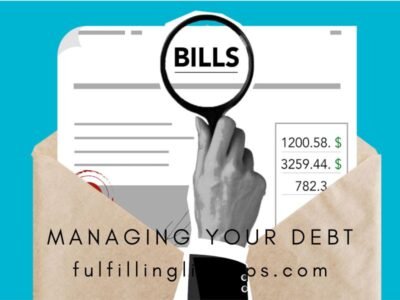A recent study conducted by the Federal Reserve indicates that approximately 77% of Americans are struggling with some form of debt. This includes credit card debt, student loan debt, mortgage debt, auto loans, and other forms of debt.
Managing debt can be a stressful and overwhelming experience. Fortunately, there are several ways to make the process easier. By creating a budget and prioritizing payments, making extra payments when possible, negotiating with creditors, and using debt assistance, you can better manage your debt and start to get back on track financially.

Tips for managing debt
1. Create a budget:
Creating and sticking to a budget is one of the most effective ways to manage debt. Take the time to figure out how much money you have coming in each month and what your expenses are. Once you know that information, you can create a budget for your debt payments.
2. Prioritize your debt:
You may have various forms of debt, each with different interest rates or payment amounts. List out each form of debt and prioritize which ones need to be paid off first. Put the highest priority on the debt with the highest interest rate.
3. Make extra payments:
Whenever possible, make more than the minimum payment each month. This will help reduce the amount of interest you’re paying and will help you get out of debt faster. If you’re able to, consider paying off an entire debt balance in one lump sum.
4. Negotiate with creditors:
Don’t be afraid to negotiate with creditors to get a lower interest rate or a payment plan that works for you. Many creditors are willing to work with customers and reduce their interest rates to keep them from defaulting.
5. Utilize balance transfers:
If you have high-interest debt on credit cards, consider transferring the balances to lower-interest cards.
6. Reduce spending:
It’s essential to reduce your overall spending if you’re trying to manage debt. Go over your expenses and figure out what you can cut back on or eliminate altogether.
7. Participate in automated payments:
Automated payments can help make sure you never miss a payment. Consider setting up automated payments for all of your debt so you know it’s being paid on time and in full each month.
8. Get paid extra: Consider taking on another job or free-lance gig
If you can find ways to get paid extra money, put that extra income towards paying off your debt. Whether it’s a bonus, a tax return, or even money earned from a side hustle, any extra money you get should go straight towards your debt.
9. Find a debt consolidation loan:
If you’re having trouble managing multiple debts, consider getting a debt consolidation loan. This type of loan allows you to pay off all of your debt with one loan and one monthly payment. Make sure to research different consolidation loan options and find one with a low-interest rate so you’re not paying more than necessary.
10. Improve your credit score:
Your credit score has a big impact on the amount of interest you’re paying when it comes to debt. Take steps to improve your credit score, like making on-time payments and reducing your debt levels.
Find out more about your credit here. Monitor it and make sure to improve it.
11. Find out your DTI
Debt-to-Income ratio (DTI) is an indicator of an individual’s ability to manage debt. It is calculated by dividing a person’s total monthly debt payments by their total gross monthly income. A low DTI ratio indicates that the individual has enough income to cover their debt payments, while a high DTI ratio may indicate that the individual is struggling to make payments.
A DTI of 35% or under is good enough.

12. Get help:
If you’re overwhelmed by debt and don’t know how to move forward, it may be time to get help. Consider talking to a financial advisor or credit counselor about your debt. They can give you advice on how to pay off your debt and can provide guidance on what options are best for your situation.
The National Foundation for Credit Counseling (NFCC) is a great place to start.
Conclusion
Managing debt requires planning and discipline. Taking the time to create a budget and prioritize your debt, making extra payments, negotiating with creditors, and taking other steps can help you pay off debt and get back on track financially.
Getting professional help if necessary can also give you the guidance and support you need.




